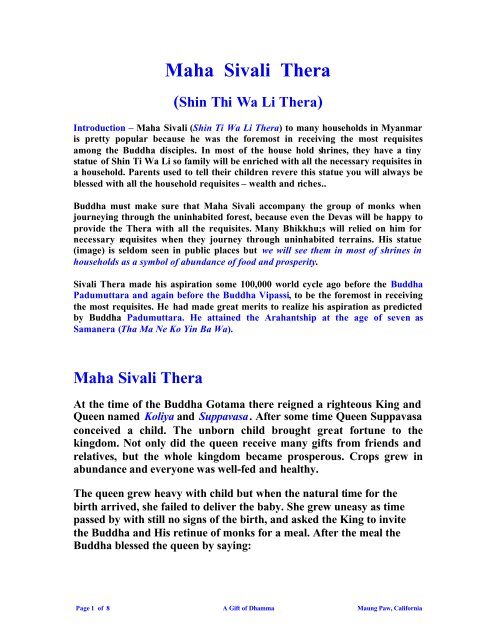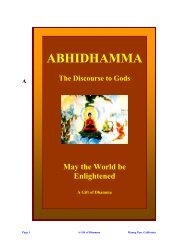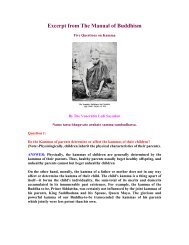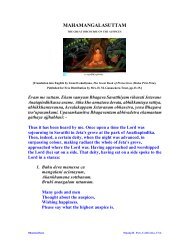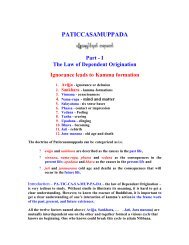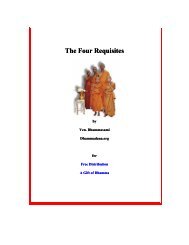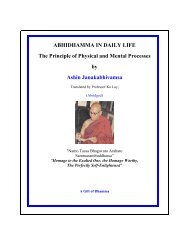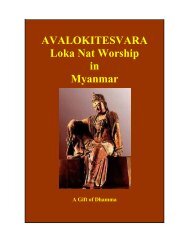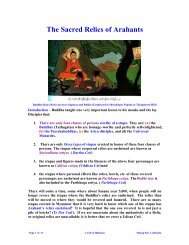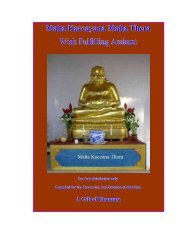Maha Sivali Thera - Usamyanmar.net
Maha Sivali Thera - Usamyanmar.net
Maha Sivali Thera - Usamyanmar.net
You also want an ePaper? Increase the reach of your titles
YUMPU automatically turns print PDFs into web optimized ePapers that Google loves.
<strong>Maha</strong> <strong>Sivali</strong> <strong>Thera</strong><br />
(Shin Thi Wa Li <strong>Thera</strong>)<br />
Introduction – <strong>Maha</strong> <strong>Sivali</strong> (Shin Ti Wa Li <strong>Thera</strong>) to many households in Myanmar<br />
is pretty popular because he was the foremost in receiving the most requisites<br />
among the Buddha disciples. In most of the house hold shrines, they have a tiny<br />
statue of Shin Ti Wa Li so family will be enriched with all the necessary requisites in<br />
a household. Parents used to tell their children revere this statue you will always be<br />
blessed with all the household requisites – wealth and riches..<br />
Buddha must make sure that <strong>Maha</strong> <strong>Sivali</strong> accompany the group of monks when<br />
journeying through the uninhabited forest, because even the Devas will be happy to<br />
provide the <strong>Thera</strong> with all the requisites. Many Bhikkhu;s will relied on him for<br />
necessary requisites when they journey through uninhabited terrains. His statue<br />
(image) is seldom seen in public places but we will see them in most of shrines in<br />
households as a symbol of abundance of food and prosperity.<br />
<strong>Sivali</strong> <strong>Thera</strong> made his aspiration some 100,000 world cycle ago before the Buddha<br />
Padumuttara and again before the Buddha Vipassi, to be the foremost in receiving<br />
the most requisites. He had made great merits to realize his aspiration as predicted<br />
by Buddha Padumuttara. He attained the Arahantship at the age of seven as<br />
Samanera (Tha Ma Ne Ko Yin Ba Wa).<br />
<strong>Maha</strong> <strong>Sivali</strong> <strong>Thera</strong><br />
At the time of the Buddha Gotama there reigned a righteous King and<br />
Queen named Koliya and Suppavasa. After some time Queen Suppavasa<br />
conceived a child. The unborn child brought great fortune to the<br />
kingdom. Not only did the queen receive many gifts from friends and<br />
relatives, but the whole kingdom became prosperous. Crops grew in<br />
abundance and everyone was well-fed and healthy.<br />
The queen grew heavy with child but when the natural time for the<br />
birth arrived, she failed to deliver the baby. She grew uneasy as time<br />
passed by with still no signs of the birth, and asked the King to invite<br />
the Buddha and His retinue of monks for a meal. After the meal the<br />
Buddha blessed the queen by saying:<br />
Page 1 of 8 A Gift of Dhamma Maung Paw, California
"May Suppavasa, daughter of the Koliya clan,<br />
Be happy and healthy and give birth to a healthy son."<br />
After the Buddha left, the queen gave birth to a beautiful, healthy son.<br />
As a mark of respect for the Buddha, who had eased the queen’s heavy<br />
burden with His blessings, He and His retinue were invited to receive<br />
alms at the palace for seven days. The prince was named <strong>Sivali</strong>, as from<br />
the time of his conception; the people’s hardships were alleviated<br />
through an abundance of rich crops.<br />
One day when Shariputra was on his alms round he visited the prince<br />
and informed him of the suffering that he and his mother had<br />
undergone because of the delayed pregnancy. Shariputra then went on to<br />
explain to the prince the unwholesome action that his mother and he had<br />
performed and the resulting effects of their actions.<br />
In a previous birth <strong>Sivali</strong> had been born as the King of Benares and had<br />
waged war on a neighboring kingdom. He had surrounded the kingdom<br />
and told the citizens to surrender or fight back. When they refused to<br />
surrender, in collaboration with his consort, his present mother, he had<br />
decided to surround the city and hold them hostage until they did so.<br />
The citizens, who did not want to fight back or live under the rule of<br />
such a king, had not surrendered. As a result they had suffered greatly<br />
without food for a very long period. Many of the sick and the elderly<br />
had died but the arrogant king and his queen had not given in. Many<br />
months later the King had withdrawn his troops and released his<br />
hostages but he had paid dearly for the suffering he had caused. At<br />
death he was reborn in Avichi hell. The delayed pregnancy and the<br />
suffering he and his mother had undergone resulting from the delay<br />
were the residual effects of this action.<br />
After illustrating the Noble Truth of suffering, Shariputra asked the<br />
prince if he would like to join the Noble Order so that he could seek the<br />
path to end all suffering. The prince was overjoyed at this invitation and<br />
agreed to join the order with his mother’s permission.<br />
The queen, who was a devoted follower of the Buddha, agreed. She<br />
escorted Prince <strong>Sivali</strong> in procession to the monastery to be ordained. On<br />
the day of ordination when his hair was shaved, Shariputra advised<br />
<strong>Sivali</strong> to meditate on the impurities of the body. <strong>Sivali</strong>, who was<br />
Page 2 of 8 A Gift of Dhamma Maung Paw, California
spiritually advanced resulting from previous wholesome actions,<br />
focused his mind as instructed. Before the completion of the shaving of<br />
his hair, <strong>Sivali</strong> attained the supreme wisdom of Nibbána.<br />
The monks soon noticed a strange phenomenon when they were with<br />
<strong>Sivali</strong>. <strong>Sivali</strong> always seemed to have an abundance of rich, fragrant food<br />
and the other requisites (robes, shelter and medicine). Monks who were<br />
with him also had the opportunity to share in the bounty. Wherever<br />
<strong>Sivali</strong> went people flocked around to prepare food for him. <strong>Sivali</strong> was<br />
indeed blessed with all the requisites of a monk.<br />
And so it was that wherever <strong>Sivali</strong> traveled he was well taken care of.<br />
He and his retinue of 500 monks were in an uninhabited forest for seven<br />
days, but they were not short of food. The Devas made sure that all their<br />
requirements were met. Similarly when <strong>Sivali</strong> was traveling through the<br />
desert his requisites were provided. The Buddha, seeing that <strong>Sivali</strong> was<br />
fulfilling a previous aspiration in His reign, declared that he was<br />
foremost among the monks in obtaining requisites. He also instructed<br />
monks who were traveling on long, tedious journeys through<br />
uninhabited terrain to be accompanied by <strong>Sivali</strong>, as with him by their<br />
side they would be ensured of the requisites. In fact, on one occasion<br />
when the Buddha and His retinue of 30,000 monks were traveling to<br />
visit the monk Khadhiravaniya Revata (Shariputra’s younger brother)<br />
they had to cross an uninhabited forest. Ánanda, fearing that they<br />
would not be able to obtain food in the jungle for such a large number<br />
of monks, questioned the Buddha about the logistics of the journey. The<br />
Buddha assured Ánanda that they had nothing to worry about as <strong>Sivali</strong><br />
was with them. With <strong>Sivali</strong> present there would be no shortage of food<br />
because even the Devas reveled in taking care of his requirements.<br />
In general the effects of one’s wholesome and unwholesome intentional<br />
actions are reaped only by the doer. However, there are instances, as<br />
with <strong>Sivali</strong>, that others too benefit from unusually strong actions of<br />
another. This overflow of the results of the effect of a person’s strong<br />
kamma on others is known as nissandha pala (overflowing results of<br />
kamma). While vipaka pala (results of kamma) are reaped only by the<br />
doer nissandha pala are experienced by others who happen to be with<br />
you. Nissandha pala could be both wholesome and unwholesome in<br />
accordance with the deed performed. For instance Shariputra did not<br />
Page 3 of 8 A Gift of Dhamma Maung Paw, California
obtain alms in one instance resulting from the nissandha pala of<br />
Losaka’s strong unwholesome deeds.<br />
To seek the cause of this strange phenomenon we need to go back many<br />
aeons to the time of the Buddha Padumuttara (App. A). <strong>Sivali</strong>, who had<br />
been born as a poor man, had the opportunity to see the Buddha<br />
Padumuttara confer on another monk the honor of being foremost<br />
among monks who obtain the requisites. Fascinated by the way<br />
everyone desired to provide alms and robes to this monk, <strong>Sivali</strong> had<br />
decided that he too would like to hold a similar position in a future birth.<br />
He had then performed many acts of generosity to the Buddha<br />
Padumuttara and His retinue and made an aspiration.<br />
The Buddha Padumuttara, foreseeing that <strong>Sivali</strong>’s aspiration would be<br />
fulfilled, had prophesied that at the time of the Gotama Buddha he<br />
would be foremost among the monks who obtained requisites. From this<br />
point onwards, <strong>Sivali</strong> had started in earnest to work toward his<br />
aspiration. At death he was reborn in a heavenly realm where he<br />
enjoyed many years of heavenly bliss.<br />
The next documented birth story took place at the time of the Buddha<br />
Vipassi, (App. A) 91 world cycles before our Gotama Buddha. <strong>Sivali</strong><br />
was born as a merchant in the City of Bandhumati. The City was<br />
preparing a great alms giving for the Buddha Vipassi and His retinue of<br />
monks, when they realized that they were short of curd and honey, a<br />
delicacy that was often served after the noonday meal. Messages were<br />
sent all over the city to obtain the required delicacy. Unable to obtain<br />
the quota required, the king’s men raised the price of the curd and<br />
honey from one gold coin to 100 coins.<br />
In the meantime <strong>Sivali</strong>, a merchant who sold curd and honey, was<br />
approached and offered 100 gold coins for his merchandise. <strong>Sivali</strong> was<br />
surprised at the unusually high offer and asked for whose consumption<br />
they were buying the curd. On being told that it was for the Buddha<br />
Vipassi and His retinue of monks, <strong>Sivali</strong> asked permission to donate his<br />
wares to the Buddha. He then renewed his aspiration to be foremost<br />
among the monks who received requisites. The Buddha Vipassi, seeing<br />
that <strong>Sivali</strong>’s aspiration would be fulfilled, blessed him by saying, "May<br />
your aspiration be fulfilled." <strong>Sivali</strong> then became a devotee of the Vipassi<br />
Buddha and practiced His Dhamma.<br />
Page 4 of 8 A Gift of Dhamma Maung Paw, California
Resulting from this strong aspiration and the meritorious deeds and efforts<br />
performed in previous births, <strong>Sivali</strong> fulfilled his aspiration to be foremost<br />
among the monks who obtained requisites at the time of the Gotama<br />
Buddha. To date, Buddhists venerate the Arahant <strong>Sivali</strong>, and often keep<br />
a picture or a discourse known as the c in their home as a symbol of<br />
abundance of food and prosperity.<br />
This was what Dr Htin Aung wrote in the book titled –<br />
“ The Ari Monks and the Introduction of Buddhism “<br />
Shin Thiwali<br />
Shinthiwali was the son of a king's daughter, and he had to remain in his mother's<br />
womb for seven long years because of a sin 7 in a past existence. Then for one whole<br />
week the mother could not give birth, and on the seventh day she said to her father,<br />
the king, 'Let me offer some gifts to the Buddha before I die.' The gifts were made<br />
and the Buddha blessed her. Her suffering ceased and she gave birth to Thiwali,<br />
who at once spoke and behaved like an adult. The Buddha's Chief Disciple, Shin<br />
Sariputtra, arrived on the scene and, receiving permission from the parents<br />
admitted Thiwali to the Order. He attained Arahatship the same day. Because of his<br />
meritorious deeds in the past he was always receiving gifts of food and robes, and<br />
was declared by the Buddha to be the foremost recipient of gifts among his disciples.<br />
The Burmese believe that he is still living, that he can be invoked to come by a<br />
prayer of special formula and that his mere invisible presence will bring them<br />
prosperity and good fortune. Therefore, a tiny image of him, carrying a staff in one<br />
hand and a fan in the other, as if ready for travel, is kept for worship in many<br />
Burmese households.<br />
Appendix – A. Twenty Four Buddhas. Starting from the time our Buddisatta<br />
received a definite prophecy from Buddha Dipankara.<br />
1. Dipankara Buddha - The Bodhisatta was born as the ascetic Sumedha and<br />
received the definite proclamation<br />
After a period of one Asankheyya there appeared:<br />
2. Kondanna Buddha - The Bodhisatta was a Cakkavatti King named Vijitavi<br />
After a period of one Asankheyya there appeared:<br />
3. Mangala Buddha - The Bodhisatta was a Brahmin named Suruci<br />
Page 5 of 8 A Gift of Dhamma Maung Paw, California
4. Sumana Buddha - The Bodhisatta was a Naga king named Atula<br />
5. Revata Buddha - The Bodhisatta was a Brahmin named Atideva<br />
6. Sobhita Buddha - The Bodhisatta was a Brahmin named Ajita<br />
After a period of one Asankheyya there appeared:<br />
7. Anomadassi Buddha - The Bodhisatta was a leader of demons<br />
8. Paduma Buddha - The Bodhisatta was a lion<br />
9. Narada Buddha - The Bodhisatta was an ascetic<br />
After a period of one Asankheyya there appeared:<br />
10. Padumuttara Buddha - The Bodhisatta was a man named Jatila (This period was<br />
100,000 <strong>Maha</strong> kappas before the advent of the Gotama Buddha)<br />
After a period of 70,000 <strong>Maha</strong> kappa there appeared:<br />
11. Sumedha Buddha - The Bodhisatta was a young man named Uttara (This period<br />
was 30,000 <strong>Maha</strong> kappas before the advent of the Gotama Buddha)<br />
After a period of 12,000 <strong>Maha</strong> kappa there appeared:<br />
12. Sujata Buddha - The Bodhisatta was a chakkavatti king (This period was 18,000<br />
<strong>Maha</strong> kappas before the advent of the Gotama Buddha)<br />
13. Piyadassi Buddha - The Bodhisatta was a young Brahmin named Kassapa<br />
14. Atthadassi Buddha - The Bodhisatta was an ascetic by the name of Susima<br />
15. Dhammadassi Buddha - The Bodhisatta was the God Sakka<br />
16. Siddhatta Buddha - The Bodhisatta was an ascetic by the name of Mangala<br />
17. Tissa Buddha - The Bodhisatta was a king named Sujata who later became an<br />
ascetic (This period was 92 <strong>Maha</strong> kappas before the advent of the Gotama Buddha)<br />
18. Phussa Buddha - The Bodhisatta was a king by the name of Vijitavi who later<br />
became a monk<br />
19. Vipassi Buddha - The Bodhisatta was the Naga king, Atula (This period was 91<br />
<strong>Maha</strong> kappas before the advent of the Gotama Buddha)<br />
Page 6 of 8 A Gift of Dhamma Maung Paw, California
20. Sikhi Buddha - The Bodhisatta was a king named Arindama (This period was 31<br />
<strong>Maha</strong> kappas before the advent of the Gotama Buddha)<br />
21. Vessabhu Buddha - The Bodhisatta was the king Sudassana who later became a<br />
monk (This period was one <strong>Maha</strong> kappa before the advent of the Gotama Buddha)<br />
22. Kakusandha Buddha - The Bodhisatta was a king named Sema (This period was<br />
in the same <strong>Maha</strong> kappa as that of the Gotama Buddha)<br />
23. Konagamana Buddha - The Bodhisatta was a king named Pabbata who later<br />
became a monk (This period was in the same <strong>Maha</strong> kappa as that of the Gotama<br />
Buddha)<br />
24. Kassapa Buddha - The Bodhisatta was a Brahmin named Jotipala (This period<br />
was in the same <strong>Maha</strong> Kappa as that of the Gotama Buddha)<br />
Reference: Relatives and Disciples of the Buddha - By Radhika Abeysekera<br />
Appendix – B<br />
Jataka Story – Shin Ti Va Li<br />
J 100<br />
Asaataruupa Jaataka<br />
Once the Bodhisatta was king of Benares. The Kosala king waged war on him,<br />
slew him and bore off his queen to make her his own wife. The king’s son<br />
escaped through a sewer and later came back with a large army to give battle.<br />
His mother, hearing of his doings, suggested that he should blockade the city<br />
instead. This he did, and the blockade was so close that on the seventh day, the<br />
people cut off the head of the king and brought it to the prince. It was this prince<br />
who became <strong>Sivali</strong> in the time of the Buddha -- the blockade had been the<br />
reason for him remaining seven years in the womb of his mother, and the<br />
reason for her being seven days in bringing him forth. The mother was<br />
Suppavasa, daughter of the Koliya king. The story was related by the Buddha to<br />
explain to the monks the reason for Suppavasaís long pregnancy.<br />
Appendix - C<br />
Verse 414<br />
The Story of <strong>Thera</strong> <strong>Sivali</strong><br />
Page 7 of 8 A Gift of Dhamma Maung Paw, California
While residing in the Kundadhana forest near the city of Kundakoliya, the Buddha<br />
uttered Verse (414), with reference to <strong>Thera</strong> <strong>Sivali</strong>.<br />
Princess Suppavasa of Kundakoliya was in pregnancy for seven years and then for<br />
seven days she was in labor pains. She kept contemplating the unique qualities of<br />
the Buddha, the Dhamma and the Samgha and in the end she sent her husband to<br />
the Buddha to pay obeisance to him on her behalf and to inform him of her<br />
condition. When informed of the condition of the princess, the Buddha said, "May<br />
Suppavasa be free from danger and from sorrow; may she give birth to a healthy noble<br />
son in safety." As these words were being spoken, Suppavasa gave birth to her son<br />
at her house. On that very day, soon after the birth of the child, the Buddha and<br />
some bhikkhus were invited to the house. Alms-food was offered there and the<br />
newly born child offered filtered water to the Buddha and the bhikkhus. To<br />
celebrate the birth of the child, the parents invited the Buddha and the bhikkhus to<br />
their house to offer food for seven days.<br />
When the child grew up he was admitted to the Order and as a bhikkhu he was<br />
known as <strong>Sivali</strong>. He attained arahantship as soon as his head was shaved off. Later,<br />
he became famous as the bhikkhu who received the largest amount of offerings. As a<br />
recipient of offerings he was unsurpassed.<br />
On one occasion, the bhikkhus asked the Buddha why <strong>Sivali</strong>, with the qualifications<br />
to become an arahant, was confined in his mother's womb for seven years. To them<br />
the Buddha replied, "Bhikkhus! In a previous existence, <strong>Sivali</strong> was the son of a king<br />
who lost his kingdom to another king. In trying to regain their kingdom he had<br />
besieged the city on the advice of his mother. As a result, the people in the city were<br />
without food or water for seven days. It was for this evil deed that <strong>Sivali</strong> was<br />
imprisoned in his mother's womb for seven years. But now, <strong>Sivali</strong> has come to the<br />
end of all dukkha; he has realized Nibbana."<br />
Then the Buddha spoke in verse as follows:<br />
Verse 414. Him I call a brahmana, who, having traversed this dangerous swamp (of<br />
passion), this difficult road (of moral defilements), the ocean of life (samsara) and<br />
the darkness of ignorance (moha), and having crossed the fourfold Flood, has<br />
reached the other shore (Nibbana); who practices Tranquility and Insight<br />
Meditation, who is free from craving and from doubt, who clings to nothing and<br />
remains in perfect peace.<br />
Reference –<br />
1. Relatives and Disciples of the Buddha by Radhika Abeysekera<br />
2. Dhammapada Verses and Stories by Daw Mya Tin.-<br />
3. The Ari Monks and the Introduction of Buddhism – by Dr Htin Aung.<br />
Page 8 of 8 A Gift of Dhamma Maung Paw, California


